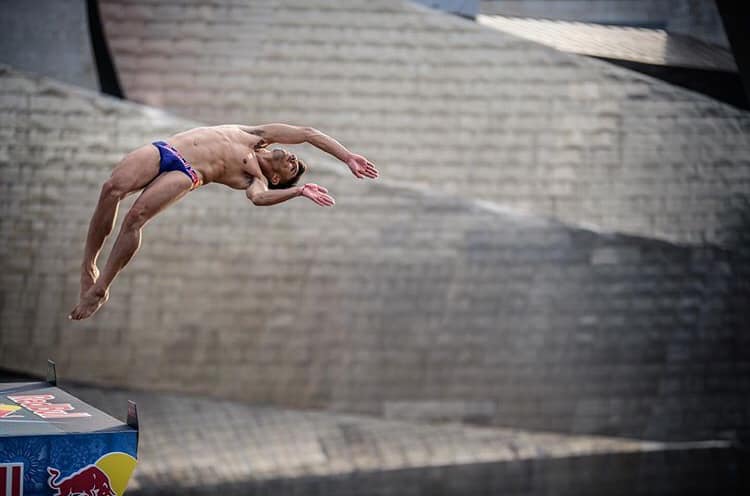If you want to grow, get better, and chase dreams you must learn to manage fear.
There was a catchy slogan put out by Nike that stated “Feel the fear and do it anyway”. For the sake of wellness and safety it should read - feel the fear, acknowledge it, manage it effectively, then do it” If we bury the fear it will suck energy from us preventing growth into a better human.
I enjoy reading about high performing athletes from different sports. There is so much overlapping wisdom to be gained. Jonathon Paredes is the world champion (2017) in the spectacular sport of cliff diving. This is a pursuit where the athletes have the most developed core strength of all sport. The divers jump from a platform 27m high and hit the water at around 85kph. As the divers hit the water (feet first as the hip joints are more stable than the shoulder joint) their legs are slowed down while the upper body is still speeding up! The link between them is the core - which is under incredible pressure to hold form and prevent catastrophic injury.
All of my Everfit athletes know my views on full body strength and I promote core strength through full body functional strength work DAILY. But what I wanted to get across from my reading on Johnathon Pardeses was his approach to managing fear and anxiety. Fear is a vital part of cliff diving as it focuses your attention on the magnitude of the challenge. It forces you to face up to the challenge and make sure the preparation is on point. Facing up to fear with an action plan doesn’t allow anxiety to take traction. Fear and anxiety are interrelated. When faced with fear, most people will experience the physical reactions that are described under anxiety (raised heart rate, increased sweating, increased blood pressure and breathing rates, tighter muscles, and a heightened general alertness) . Fear causes anxiety, and anxiety can in turn drive fear. This then can escalate the experience into something far more catastrophic than it actually is.
“Of all the liars in the world sometimes the worst are our own fears.” Rudyard Kipling
We all feel fear and anxiety in our daily lives and we have a choice. We can bury it and not deal with it effectively (it then tends to fester and bubble up again with more venom), or we can confront it with the respect it deserves- break down the components, work out how to deal with the factors that make up the fear and get to work! It has been shown that the best way to deal with rising anxiety symptoms is to face it - talk about it with a trusted friend, come up with a proactive plan, then put some action towards what’s driving the anxiety. Putting the discomfort that anxiety produces aside until you “feel like facing it” can increase further anxiety. My favourite podcast host and plantpowered athlete Rich Roll states “emotion follows action.” Rather than waiting for the right time and feeling like it - start with some action and your mood will improve.
When you have broken down the steps to face, then you can visualise how to tackle each one, then you can practice - and repeat. Paredes then talks about controlling the fear after putting the action steps in place. This then deals effectively with the anxiety that the fear will drive. Fear relates to a known or understood threat (jumping off a 27m height) whereas anxiety follows from an unknown, expected or poorly defined threat which can spiral out of control (what could go wrong with the dive, associated possible injuries, poor placing in competition, losing potential sponsors, not having money to pay the bills, being destitute etc). Fear and anxiety are part and parcel of living. Much like stress, and sadness. We can’t be fearless, relaxed, and happy all the time. In fact having these “negative” states actually make the opposite states more meaningful.
To live fully we must embrace fear, sadness, and the feelings they bring up. It’s only then can you be proactive about planning to use these states to become a better human.
“You never conquer the fear....you just manage it.” Paredes
Tips to help manage anxiety
1) Journal writing - noting down feelings can help identify fears, starting the process of proactively dealing with them to enhance growth. Scheduling in some writing first thing will help dial up proactively, and writing before bed can assist with sleep quality.
2) Meditation - spending time focusing on your breathing and letting thoughts and feelings come, recognising them (tagging) and then letting them go is a powerful way of ramping up your parasympathetic system which is your rest, digest, restore system. This will help directly with symptoms of anxiety. This act of being present is also very grounding where fear is concerned - it prevents anxiety getting away from us, and spinning out of control.
3) Movement in nature - going for a walk on the beach (barefoot), in the bush, or a swim in the cold ocean has been shown to calm the entire system down. The more time spent in nature compared to urban concrete areas is directly linked to better health outcomes.
4) Schedule time to meet one of your uplifting friends face to face. Have an authentic talk about how things are going, what issues are creating anxiety, and discuss some practical ways of approaching them.
My book 'Holistic Human - Expansive Wellness Habits for thriving humans on a healthy planet' is available through my site for NZ and Australia https://everfit.co.nz/Store/holistic-human-book
Photo credit - @jonathonparedes89 instagram account


.jpg?version=8)